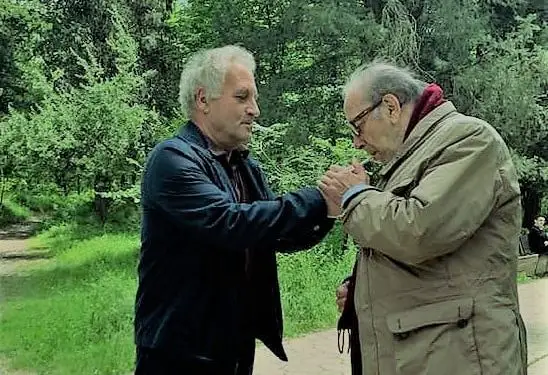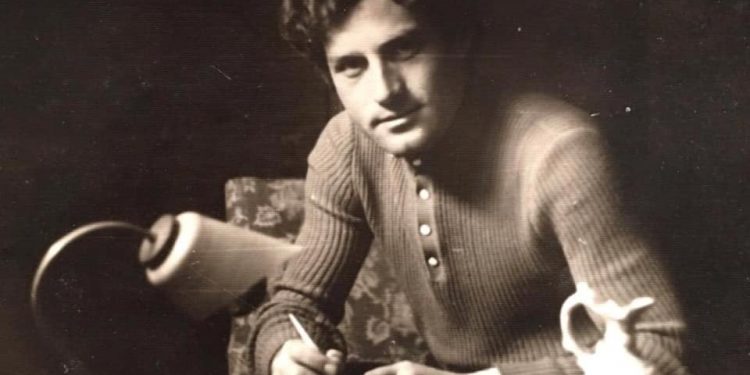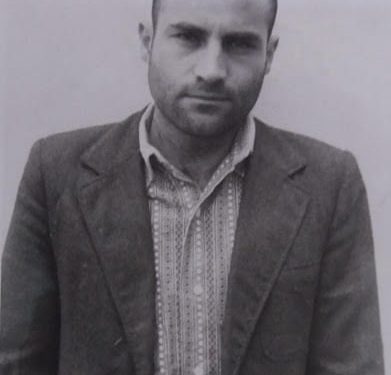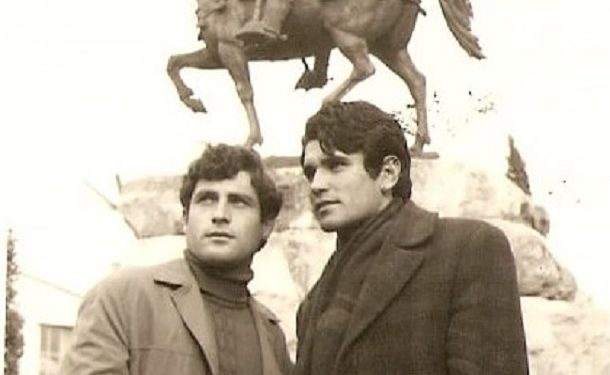By Fatbardh Amursi (Rustemi)
Second part
In a bang, in a neighborhood and in a city…!
Entry
Memorie.al/ Tript of this article, which could have the subtitles: “to go to jail for poetry”, “to see through a wound” and “to win over evil with poetry”, was written by friend for friend, Fatbardhi for Visar. Both grew up in the same town, in small Lushnja, with a large class war then, where in the suburbs began the villages of internment.
Visari and Bardhi were from the same neighborhood, went to the same school, and even stayed on the same bench until they finished high school. They liked poetry and started writing. But the fates would then be different, even opposite. While Bardhi was sent to study literature at the University of Tirana and became a high school teacher, Visar managed to go to Shkodra to study literature as well, because he “had a biography” against the regime, but he shot in the few years of liberalism, as they were called and to be punished immediately…!
And here the paths of two friends of the same bank are divided. Visar would be arrested for his poems and sent to prison, the court gave him 10 years in prison, depriving him of the right to publish and electoral, if he was released, while Bardhi would continue with the publications, from poetry to comedy, putting them in different scenes, etc.
Visar has shown with his later books his ordeal, mention and close friendship with Bardhi in his early youth, but it is interesting how Bardhi now sees what happened to his friend, the anti-visar time…!
The triptych begins, when the two were in two different mines, Bardhi was taken with creative permission to the socialist mine of Pishkashi, to know the working class and to write, while Visar is in the mine of Spaç prison, convicted as an enemy , who secretly writes poetry as a prisoner.
Truly a special essay, written in a friendly way that makes you discover, no matter how little, the times, the mentalities, the changes, the divisions, the unions and to feel more than being a friend, the poetry of life, should be stronger than regimes and are acts that face forgetfulness…!
Author
Continued from the previous issue
For years we were comrades in arms, where the wisdom of teacher Liri Kazazi, remained as a blessing on our arduous path to art. When I read the poem “To (not) blush”, which, it takes, does not work from cosmetic interventions to remove redness from the face: “… because it is a shame to be ashamed. You should not blush anymore “, reminded me of Visar’s face, which was on fire in difficult moments. Did he find red appearing in him?! A traveler on a winter night knocks on a highland door. A young woman opens it: “He did not raise the lantern to see who I was. / It is enough that my face was human”. It is the same situation of a song that was liked by the public: “You come to me without knocking”. The one that came without knocking on the song, was “ours”, while the one of poetry: the undesirable?! They fanned themselves and remembered that it was us.
In the banga, as a schoolboy and student, between the bangs as a teacher, growing up with the bookshelves in sight, where: “The sacred desire of growth / forced us to become men / railways. ” How did we know that one day, Visar would wait for another gang, that of the accused?! Even the “prison school” was deficient?! We read almost the same books, rejoiced in the pathos of construction, transformations, ran after the cloud, admiring the ideals and hating the claim that man should live for the state.
One cannot help but be impressed by the demonic zeal of the creators and editors, where the indictment against the poet takes the authority of a claim: “This enemy element is convinced of his erroneous and hostile thoughts.” The use of the term inorganic world “element” came as a threat to the living world. No wonder Ayn Rand, her novel about the Stalinist period of terror, calls it “We the Living”. (Catching the border trespasser, the line trespasser, resembled the wooden rifle battles that once took place in Mexico, because capturing a living enemy cost a lot in the black market of captives. Slaves had to be mined.)
“This pseudo-poet instead of putting talent in the service of the people (Pseudo-poet has talent in us?! FR) … pours poison into the mind and feelings of the reader” (How can these happen, when the book is unpublished and, the reader, did not have contact with him, did we get infected?!) Moreover, the author: “It is closed and uses figures that cannot be decomposed”?! It is not in vain that one of the gods of Olympus addresses Prometheus: “Speak clearly, Prometheus, not with enigmas”! In fact, the misery had come to him from unrestrained words. ” (If thieves do not manage to break into a safe, then should we blame the owner?! An airtight place is afraid of hermeticism?!) “Tired of not finding”, where a “word orphan / says it all”, accustomed that “In the forbidden I find what I want”, the poet walked on unexplored roads, a right that: that was known to the guides.
“Just a little friendly advice: do not forget that in the speech it was said what awaits those who think they are smarter than the party” – says one of the characters of Ayn Rand. It was removed that Naim’s “Words of the candle” were kept as trusts, but that the “red or blue torches” were violated in the first case: “Befriend me, / Do you love me as I love you, / One “Do not love the other, / do not work the wicked”. In the time of the torches, the words of the candle do not apply to even one: “The soul shines”. Who was doing iniquity to the poet or his accusers?
“This pseudo-poet with imitations of reactionary art has tried to plant poisonous herbs in our pure literary garden and thus spoil our literary atmosphere.” To keep the manuscript in the drawer for 7 years and complain that it was doing damage to the socialist garden, is it like expecting protagonism from a living thing, kept in an incubator? But the poems that Visar published in the literary press were followed by a positive echo. His poetic image was quite different from portrayal in the indictment. He was not seen as a wrongdoer. “The people we are leading are not growing, they are shrinking. ”They are shrinking to a level that no human being has ever achieved before,” complains Russian-American writer Ayn Rand. The shrunken ones could not bear the swelling of anyone, just as the arrogant ones were enraged by the pride of anyone, feeling challenged.
Visar and I were not only friends of a call, but also of a neighborhood. (It turned into a proverbial joke that his father, Hekurani, a pop actor, used to say to Dhimitër Shuteriq, president of the Writers’ League at the time: “I am a neighborhood writer.”) But his son will not hide them Pretends. “The windows / are my cry to be abandoned / the dark room of solitude.” It is likely that this poem will be of a time with the change of the title of Kadare’s novel, from “winter of great loneliness”, to “Great winter”, where the word “loneliness” is removed.
The regime did not tolerate the word “loneliness”, but the poet’s cry in this case was against the “lone hero”. Ndoc Gjetja has a poem, where he coughs at home so as not to feel lonely. Almost the same. When the regime punished, the children had to abandon you, the wife to separate, the friends to leave, so you were left alone. In this poem, say the accusers, “there is a certain sincerity. “As an enemy element, he feels lonely and abandoned in our socialist environment.”
Why did he have to feel that way, still without being accused and judged as an enemy? They express for granted what was expected to happen: the abandonment of the condemned poet. (Visar had more friends than all of us). Poetic individualism had to be punished with an exemplary punishment. If you are alone and wake up grandfather, you still try to get rid of loneliness. But the nephew in one place the father, as if he were raising Christ. “- Grandpa, grandpa, get up…! / -What is it, son? / -I’m afraid you will not wake up anymore”. The investigator shouted at me that “it is a call to raise upside down classes, since your grandfather was declared a kulak”. Surprisingly, this perverse conjecture happened to the dictator’s widow, where the bride goes to wake him up: “Get up, mom, because the newspapers are writing that you are dead”!
“Sincerity in art” was called a revisionist thesis. This is a warning to all those who wrote sincerely. And lo and behold: “I did not advance in art, because I wanted ruins / but they did not love me (and did not help me), because I, becoming a man, would be a talent / terrible … my heart like a mouse / that burns itself. ” This is the essence of all these hostile shows…! “The author is not satisfied with our reality and is ready to break his ribs, just to come out of this reality, which he calls the turret”, underline the accusers. Only reality is not seen in this verse, except the poet’s revolt against the artificial obstacle that is done to him, but which is in fact the censorship of the state. The conflict goes beyond an editorial office, but he does not see it.
The ruins are attractive to legends, but not for living. “Deny the best the right to capture the peaks, and there will be no name or mark left from them. And what are your measures, but dull, withered, moldy souls, who have no thoughts of their own, their own will, who eat, sleep and chew mindlessly words that others put in their brains”? It is the same conflict as in Ayn Rand’s novel The Living, where the inconformist declares war on those who are accustomed to licking the yoke and eating the bread of humility. He foresees his shameful fate, say the accusers, while the poet sees his own evil in the “terrible” talent. It is a duel that has lasted 7 years, where the parties do not give way to each other.
In the poem “In the big amphitheater”, doses of dissatisfaction are added: “Maybe a brave boy, / (he had my face) / was imprisoned in the hall with tigers, / because he wanted to revolt”. The poet had given them material, to attack him. He finally agrees with fate: “I did not have to tell the investigators that I liked the evenings in Tirana so much and, to be bored until late, I did not go through my cousins, but, since I did not have enough money for a hotel, I slept happy gardens. On the big autumn leaves, I wrote poetry…!
You cannot escape the punishment, but reduce its pains and sorrows, so that they are not always. “That you were destined for defeat,” Visari wrote in the book “Roads of Hell”. Why do you rush to call him “enemy”, even before the court rules? Because the fate of the poet was predetermined. It was marked, as the woodcutter makes marks on the tree, to be cut down in the forest. The order came from Ramiz Alia. (His accomplices wrote to Ramiz Alia from the cell. Ramiz also wrote a prison book, but will he be included in the “prison literature”?) “, A former prison police chief, attacks the poet again? How is it possible that up and down they are made against him, both in dictatorship and in democracy? Because in Albania there is talk only of overthrow. The luckiest turns out to be Enver Hoxha, who was overthrown only in September.
We were not only in a bang and in a neighborhood, but we also lived in a city, known for internment centers more than in any other area of Albania, while it was praised as the “barn of Albania”. Barn or pantry? If Migjen’s “allegorical sun” was taken as a good omen, “Visar’s second sun with bleeding blood” was interpreted as a black omen. The paranoid, having a monopoly on symbols, and the most candid verse: “I know it will come out in a sunny field”, which, you find in almost all poets, took it as an equivalence, as a path to paradise lost”. What optimist would not be thrilled by this verse: “A cob to swell / fill the hand with sweet grains of hope”? And further: “I loved the grain in the surroundings / The ears that fell on the edge I wanted / How many times I stripped love / How many times I dressed with love”.
The adrenaline rush: “I loved the groceries in the area / Kallinjë fallen in the books I wanted / To close your eyes like the cover, / To continue the book, it makes itself again”. Regular, traditional verse poems passed peacefully, while doubts were thrown to the free verse. “In poetry we should have been happy,” writes Visari, but his lyrics are not pretense. Boyish impulses emanate from them. “How many times have we chased your chariots / through the blind alleys all mud / We remember you, with unshaven beards / with whips you did not hit / but you kept them high.” See what a contrast is created between the coachmen and those who did not spare St. Peter’s whips on the poet. “Toothed town / small town / where the same event was repeated from time to time / We, the newcomers, were given a house / like a nest in the armpit of a window”.
Gratitude for musky generosity. “My weakness to be as loved as possible was pointed out by others. “My narcissism – to drown in beautiful eyes.” You can marvel at the “blue eye”, but you can also fall into a skeptical pit. “We do not accept anything over our heads / we can very much accept our hats”, – he writes in the poem “Working people”, the last power of the people. “No, no / I do not dye my shoes / To the polishers! / I do not like people at my feet”. Why should the poet be viewed with suspicion, when “proletarian simplicity” was also preached by: “The terrible twilight sphinx / stands gloomy over the desert / His heavy stone majesty / made him, ah, motionless!”
The city that would inspire him in his youth, the cotton balls, the coachman, would disappoint him later, when he would return from prison. “The city does not speak to me / The city has forgotten me. Paranojak is the city / Roads do not lead me to the end of an opinion “. I was very shocked when I found my blind father, they had not told me in the letters they sent me, so as not to despair…! “Unfortunate old man, blind / blinder than the night. ”No star will help you.” And in the end he claims sadly: “My darkness blinded him”…! /Memorie.al
Continues in the next issue















